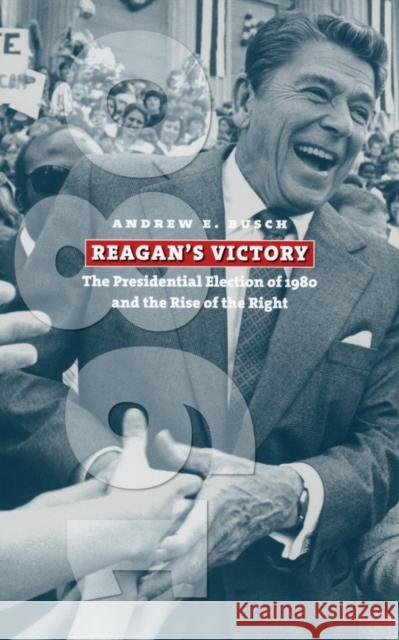Reagan's Victory: The Presidential Election of 1980 and the Rise of the Right » książka
topmenu
Reagan's Victory: The Presidential Election of 1980 and the Rise of the Right
ISBN-13: 9780700614080 / Angielski / Miękka / 2005 / 248 str.
Reagan's Victory: The Presidential Election of 1980 and the Rise of the Right
ISBN-13: 9780700614080 / Angielski / Miękka / 2005 / 248 str.
cena 106,61
(netto: 101,53 VAT: 5%)
Najniższa cena z 30 dni: 101,34
(netto: 101,53 VAT: 5%)
Najniższa cena z 30 dni: 101,34
Termin realizacji zamówienia:
ok. 30 dni roboczych
Bez gwarancji dostawy przed świętami
ok. 30 dni roboczych
Bez gwarancji dostawy przed świętami
Darmowa dostawa!
Many have pointed to the Iran hostage crisis, others to galloping inflation. In reality, as Andrew Busch makes clear, Ronald Reagan's defeat of President Jimmy Carter in 1980 was attributable to more than any one issue, no matter how galvanizing. It marked the growing ascendancy of conservative attitudes that had been brewing for two decades--and marked the clear end of the era of New Deal liberalism.
Busch offers the first comprehensive study of this contest, going beyond journalistic accounts to show why it remains one of the truly landmark elections of the past century. Through a compelling story full of colorful characters, unexpected plot twists, and dramatic finales, he reveals how it both reflected the politics of its time and foreshadowed our nation's political future. Beginning with Carter's "crisis of confidence" speech on July 15, 1979, Busch introduces the field of candidates, follows their campaigns through the primaries and general election, identifies the key turning points and winning strategies, and assesses the results, including the GOP's first Senate majority in twenty-six years. He shows how the Democrats were weakened by the demise of the New Deal coalition and a decline in public confidence, while Republicans were bolstered by the growth of the conservative movement and by all that had gone wrong during the Carter presidency. He also examines the creation of a Sunbelt coalition, the growing influence of religious conservatives, and the independent candidacy of John Anderson, which held Reagan's majority to 51 percent and foreshadowed Ross Perot's 1992 run. Reagan's victory marked a major turning point in American presidential history, realigned the demographics of party affiliation throughout the nation (especially in the nation's Sunbelt), and gave conservatives their first real victory in their fight against Big Government. Busch's book recaptures the people and events of that historic campaign and greatly enlarges our understanding of American politics from the 1960s to the present.










